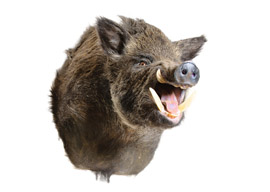
July 23, 2016

Source: Bigstock
When I was a boy I had a classmate (with whom my relations were neither particularly friendly nor particularly unfriendly) whose ambition was to be a taxidermist. He gave us to understand that he knew already how to stuff a weasel, a dog, or a cat, but he wanted to move on to bigger game such as hippos and rhinos, for which he needed further training (and no doubt a supply of subjects).
How does a 14- or 15-year-old boy decide that he wants to be, of all things, a taxidermist? It is part of the eternal multifariousness and incalculability of mankind”though nowadays, I suppose, with the complete colonization of all young minds by celebrity culture, it would be difficult to find a 14- or 15-year-old with so modest an ambition as to stuff elephants for the Natural History Museum.
I have no idea whether he ever achieved his ambition, but I think he probably did, for he was, at least in my recollection, the type of boy who would neither change direction lightly nor give up easily. He was something of a dandy, with slicked-back hair (dangerous at the time) and a large ring, which consorted oddly with the evisceration of animals and the other things it was presumably necessary to do to animals to stuff them.
I had not thought of him for fifty years when, in a scientific bookshop, I happened across a book with the title Crap Taxidermy. It was placed in a display next to the cashier among other books that offered light relief after the heavyweight volumes of the rest of the bookshop, much as supermarkets offer unnecessary items at the checkout counter that people put in their baskets for something to do while they wait their turn.
I picked it up, though I am averse to books with vulgar titles. I suppose, though, that one must move with the times, unattractive as they may be (and all times are unattractive to those who live in them). In the 1980s, a distinguished professor of philosophy, Max Black, published an essay, “The Prevalence of Humbug”; thirty years later, a distinguished professor of philosophy, Harry Frankfurt, published an essay, “On Bullshit.” There are no prizes for guessing which of these gained the greater notice of the public, though the former was superior to the latter, and not only in title.
But the book on bad taxidermy lifted my spirits immediately, its title notwithstanding. The author, having come across a few instances of bad taxidermy, invited people from around the world to send in photographs of local examples of the genre. What a wonderful thing is the internet! A collection of appallingly badly stuffed animals”that otherwise would have taken many years and incessant voyaging to collect, and even then might not have been obtained”was amassed in practically no time at all, without the collector even having to move from her room.
I accept, of course, that some people might think that photographs of badly stuffed animals are not worth the collecting, even at the very slightest expenditure of energy. Some people might remain completely unmoved by the sight of microcephalic wolves or cross-eyed bears, or of stuffed moles pushing miniature lawn mowers, but I was not. The sight of harmless endeavor gone wrong always comforts me; it makes one’s own failures seem so much the less dispiriting. I can think of few things worse than to be constantly surrounded by triumphant success.
My favorite of the badly stuffed animals was a guinea pig wrapped round a knuckle-duster used for criminal purposes (are there any other purposes for knuckle-dusters?). I found this implement, a kind of physical mixed metaphor, both intriguing and amusing. I laughed when I saw it, which caused the cashier to look at me uneasily.
The guinea pig, after all, is the very model of an inoffensive creature, the vegetarian pacifist par excellence. Utopian pacifists, indeed, conceive of human society as one composed of people with the temperament and manners of guinea pigs, who never raise their voices above the liquid vociferations of these small animals.